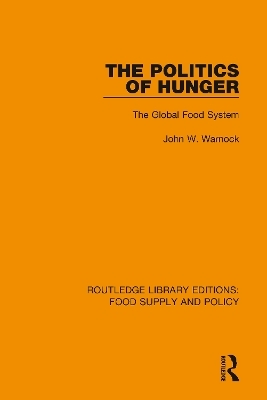
The Politics of Hunger
The Global Food System
Seiten
2021
Routledge (Verlag)
978-0-367-27600-3 (ISBN)
Routledge (Verlag)
978-0-367-27600-3 (ISBN)
Originally published in 1987. This provocative book explains the persistence of hunger, poverty, and the lack of balanced development in many countries and the central role of agriculture in economic development. It surveys the evolution of agriculture under colonialism in Latin America, Africa, and Asia.
Originally published in 1987. This important and provocative book explains the persistence of hunger, poverty, and the lack of balanced development in many countries and the central role of agriculture in economic development. Most theories of agricultural development are based on the experiences of western Europe and the United States while the two models for successful "late development" have been Japan and the Soviet Union. This book surveys the evolution of agriculture under colonialism in Latin America, Africa, and Asia and concludes that this long period distorted the development prospects for these areas and retarded the production of food. Under strong state capitalist governments, a few underdeveloped countries have broken the colonial patterns of development. However, other post-revolutionary societies are having far less success because of economic blockades and outside military intervention.
While the primary focus of the book is on the short-run problems of inequality, the author examines the long-run ecological and resource constraints to a sustainable food system and raising the standard of living in the underdeveloped world.
Originally published in 1987. This important and provocative book explains the persistence of hunger, poverty, and the lack of balanced development in many countries and the central role of agriculture in economic development. Most theories of agricultural development are based on the experiences of western Europe and the United States while the two models for successful "late development" have been Japan and the Soviet Union. This book surveys the evolution of agriculture under colonialism in Latin America, Africa, and Asia and concludes that this long period distorted the development prospects for these areas and retarded the production of food. Under strong state capitalist governments, a few underdeveloped countries have broken the colonial patterns of development. However, other post-revolutionary societies are having far less success because of economic blockades and outside military intervention.
While the primary focus of the book is on the short-run problems of inequality, the author examines the long-run ecological and resource constraints to a sustainable food system and raising the standard of living in the underdeveloped world.
Preface 1. The Persistence of Hunger 2. Ideological Approaches to World Hunger 3. Agriculture and Economic Development 4. Agriculture and Late Development: Latin America and Africa 5. The European Impact on Asia 6. The Industrial Food System 7. The Unequal Distribution of Population and Foodlands 8. The Loss of Foodland Resources 9. How Much Food Can the World Produce? 10. Developing Food and Agriculture Under Capitalism 11. Alternatives for Underdeveloped Countries 12. Summary and Conclusion
| Erscheinungsdatum | 09.03.2021 |
|---|---|
| Reihe/Serie | Routledge Library Editions: Food Supply and Policy |
| Verlagsort | London |
| Sprache | englisch |
| Maße | 156 x 234 mm |
| Gewicht | 648 g |
| Themenwelt | Sozialwissenschaften ► Soziologie ► Spezielle Soziologien |
| Technik ► Umwelttechnik / Biotechnologie | |
| Wirtschaft ► Volkswirtschaftslehre ► Wirtschaftspolitik | |
| Weitere Fachgebiete ► Land- / Forstwirtschaft / Fischerei | |
| ISBN-10 | 0-367-27600-3 / 0367276003 |
| ISBN-13 | 978-0-367-27600-3 / 9780367276003 |
| Zustand | Neuware |
| Haben Sie eine Frage zum Produkt? |
Mehr entdecken
aus dem Bereich
aus dem Bereich
eine Einführung
Buch | Softcover (2024)
De Gruyter Oldenbourg (Verlag)
29,95 €


